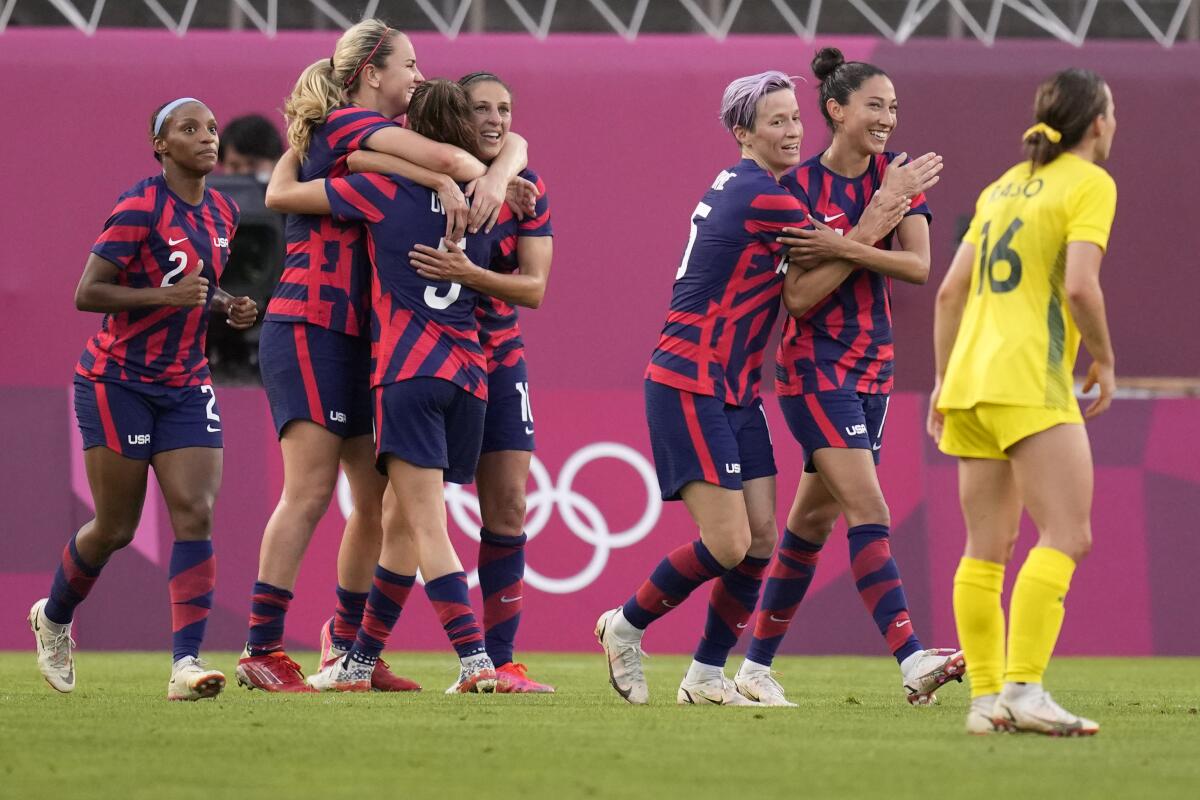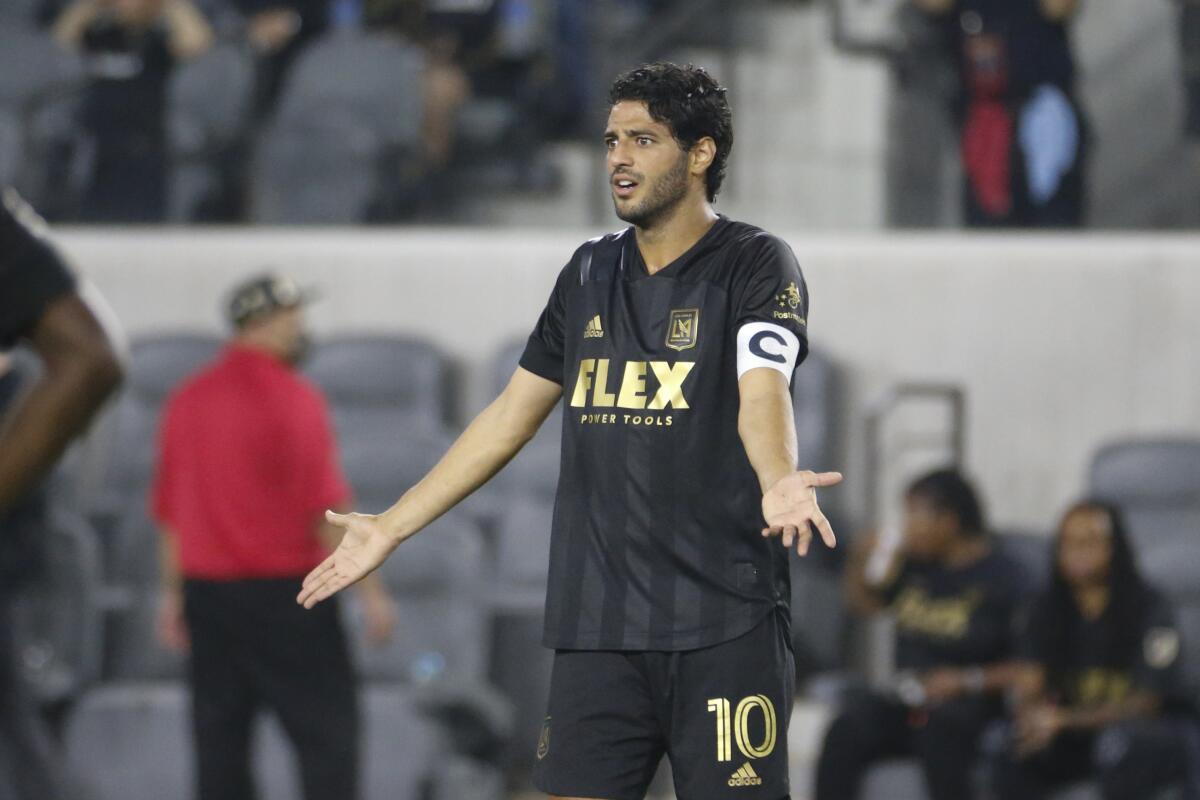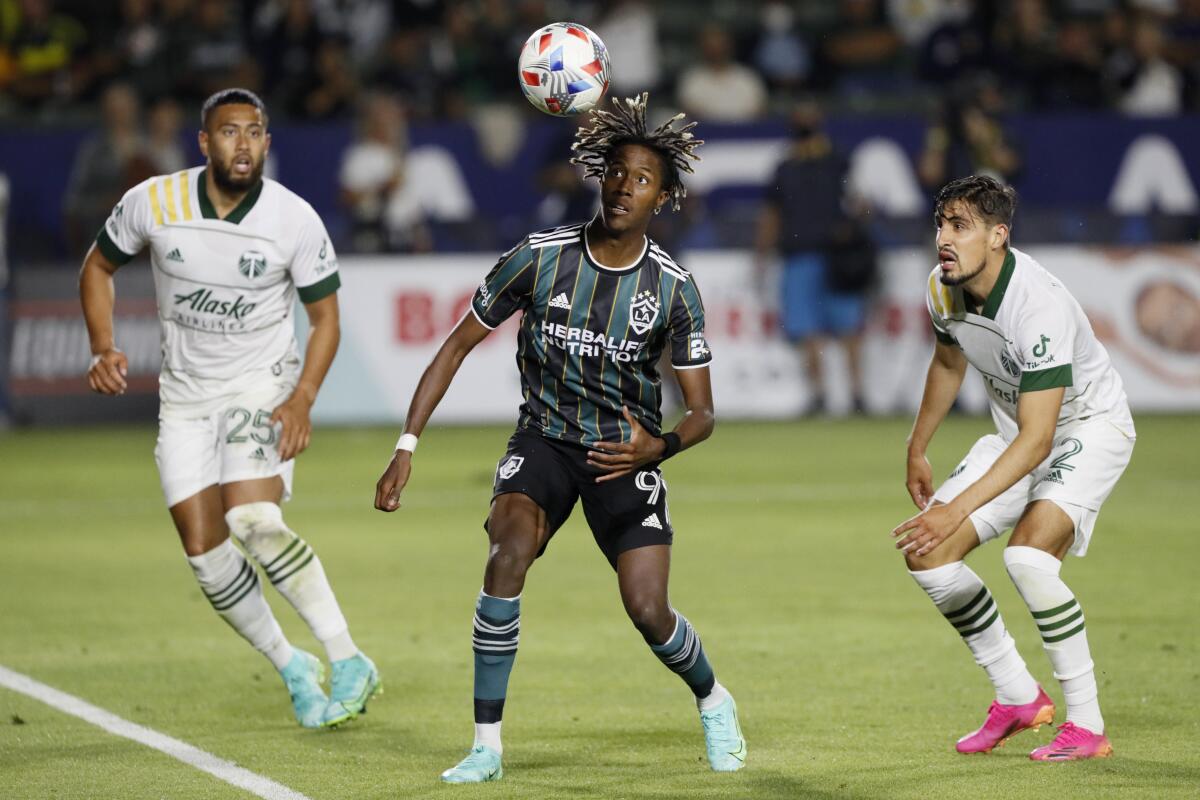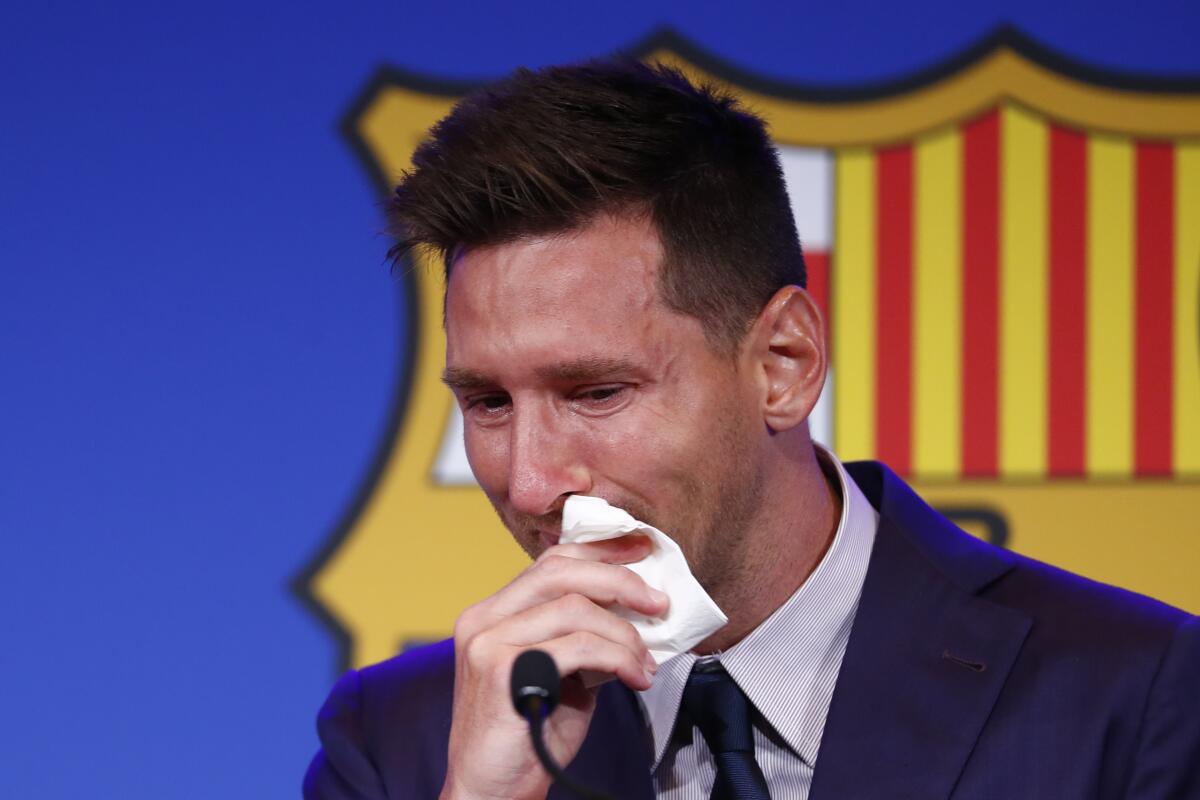Carli Lloyd says USWNT needed to struggle to realize it’s time to pass the baton

Hello and welcome to the L.A. Times soccer newsletter. I’m Kevin Baxter, the Times’ soccer writer, and as you read this, I should be 36,000 feet over the Pacific and winging my way back from the Tokyo Olympics.
The COVID Games were my fourth Olympics and the first I covered in which there were no fans. Face masks were ubiquitous, everyone was required to use hand sanitizer in copious quantities before entering a building, there was regular coronavirus testing and social distancing was strictly enforced at most venues.
The players felt the differences too.
“This whole tournament has been about adapting,” USWNT veteran Carli Lloyd said. “No fans. Can’t leave the hotel. Stand 10 feet from [the media]. Everybody’s in the same boat.”
The tournament almost certainly marked the last competitive international event for Lloyd. She and Megan Rapinoe dropped hints multiple times that more than a decade and half of sweat and sacrifice was enough. And with the next Women’s World Cup two years away, Lloyd is anxious to start spending time with her husband and family, with whom she recently reconciled after years of estrangement.
“It’s always kind of been in the back of my mind,” she said of retirement. “But I’ve always wanted to be the one to dictate that, not media and not coaches.”
A better coda for a spectacular career would have included a gold medal, but if Tokyo proves to be the end for Lloyd, her exit was pretty good just the same. She scored twice in the bronze-medal game and her final goal was classic Lloyd, with the veteran forward racing Australian defender Alanna Kennedy — 13 years her junior — to a Christen Press through-ball, then beating former UCLA keeper Teagan Micah with a clinical finish.
Here’s another reason it was a classic Lloyd goal: In three of the four Olympic Games she played in, she scored the last U.S. goal to win her team a medal — two of them gold and the last one bronze. It also was the 128th goal of her career, tying Germany’s Birgit Prinz for fifth all time, and her 10th in Olympic play, most by an American.
“Obviously we were striving for gold,” said Lloyd, whose 312th international appearance gave her sole possession of second place on the all-time list. “When you get third place in a World Cup, you get a little chintzy medal from FIFA. This [bronze] isn’t chintzy. It’s just a different color. Not everybody gets them and it’s truly special and we had to dig really deep to get it.”
Lloyd and Rapinoe are not the only ones for whom the bronze medal likely will be a parting gift. The U.S. roster in Tokyo included 17 players off the victorious 2019 World Cup team, and if the Games had been played on time a year ago, the Americans might have become the first team to win world and Olympic titles in the same cycle.
But the Games were delayed by COVID-19 and by the time the U.S. got to Japan, its team averaged more than 30 years of age, making it the oldest one the Americans ever fielded. It looked every bit its age, shut out three times in its first five games.
The U.S. had gone 44 matches and more than 2½ years without a loss when it left for Tokyo. It then lost twice in 12 days after it got there, marking the end of a spectacular run.
The team will need an extensive remake ahead of the 2023 World Cup. Lloyd turned 39 in Japan and Rapinoe, who also scored twice in the bronze-medal game, turned 36 last month, the same age as captain Becky Sauerbrunn. Alyssa Naeher, Kelley O’Hara and Tobin Heath are 33, Alex Morgan and Press are 32.
That’s eight starters who are older than anyone on the rosters for Japanese, Chinese and Zambians — combined. Tokyo clearly marked the end of one era and the start of another one for the U.S. women’s team. For Lloyd, a two-time world player of the year, it feels like the right time to hand off the baton.
“Not to put this in a bad way, but when you win a lot it’s like how do you keep finding that next gear and that next push to keep getting better and better?” she said. “That’s why winning the World Cup and then turning around and winning an Olympics is challenging. We lost our way a little bit. I don’t think it was one particular thing, but I think that we maybe needed this tournament to go the way that it did for everybody to realize how important that culture is.
“On paper yeah, we look like the best team in the world. But talent doesn’t get you medals. Every medal that I’ve won, every World Cup that I’ve won, we haven’t necessarily been the best team, but we’ve had the best mentality and the best fight.”
It’s time to let others continue that fight.
Is Mexico about to experience a continental shift?
Speaking of Tokyo, it was a little surprising to hear Jaime Lozano, coach of Mexico’s Olympic team, talk about the importance of young players going to Europe near the end of his team’s run to a bronze medal.
But he’s not wrong.
After Mexico’s semifinal loss to Brazil in a penalty-kick shootout — El Tri followed that with a dominant performance in a 3-1 win over Japan in the third-place game — Lozano was asked if the players on his team would be able to use the Olympic experience as a springboard to a permanent spot on the senior team, as players on the 2012 gold medal-winning team did.
Lozano used his answer to say he hoped to see “the majority of our players, the overwhelming majority, make it to Europe to play in good clubs to play at the elite level.”
That’s a formula the U.S. has used to great success lately — and the contrast with Mexico is striking. In last June’s Nations League final, the U.S. fielded a roster that included 19 players from European clubs while 15 players on Mexico’s team played in either the domestic Liga MX or MLS.
Changing that would appear to be at odds with the strategy new Liga MX president Mikel Arriola has adopted to strengthen the league. Arriola frequently touts statistics to buttress whatever points he is trying to make, and one of his favorite figures lately has been the explosive growth in value of Liga MX players over the last dozen years.
That has been aided, in part, by the decision of many Mexicans — among them Luis Rodríguez, Henry Martín and Orbelín Pineda — to stay home and the return of others — Carlos Salcido, Memo Ochoa, Uriel Antuna and Héctor Moreno, for example — who had gone to Europe.
That may be changing. In July, JJ Macías joined Spain’s Getafe on a season-long loan, while Pineda reportedly will join El Tri teammate Néstor Araujo at Celta Vigo in December. Jorge Sánchez, the right back on the Olympic team, has been tied to Tottenham and Everton. Other players soon could enter similar conversations.
I don’t buy the argument those moves will hurt Mexican soccer. It certainly didn’t hurt the U.S. Not only did the national team get stronger when young players such as Zack Steffen, DeAndre Yedlin, Reggie Cannon, Weston McKennie and Chris Richards left for Europe, but MLS never has been stronger — or more popular — as well.
Having national team players compete and succeed in the biggest leagues in the world creates excitement and makes players better. But just as important, it also opens spots on domestic rosters and creates opportunities for young players to develop.
And there’s a market for young Mexican players, which should interest their clubs. América got more than $15 million when it let Raúl Jiménez, a star of the 2012 U-23 team, go to Atlético Madrid.
“The Mexican player has to understand that leaving will generate a football maturity and in the long run an interesting economic return,” said Carlos Hermosillo, who played 13 years for the national team but just five games in Europe.
“The clubs have to understand that in order to grow our football, we have to generate young players.”

LAFC ties franchise record for futility
LAFC’s tailspin may now be a death spiral with Sunday’s 2-1 loss to San Jose extending its winless streak to five games, tying the franchise record. It’s not just the fact that LAFC is losing but, rather, how it’s losing that is most troublesome.
Two years ago LAFC broke the league record for points in a season and tied the MLS mark for goals with 85. It has the last two Golden Boot winners in Carlos Vela and Diego Rossi. But it’s not the same team.
LAFC (6-7-5) hasn’t scored more than two goals in a game this year and got just one on its own in its last two games, with Sunday’s lone score in San Jose coming on an own goal.
“There’s no doubt we are frustrated as a group,” said coach Bob Bradley, whose team has a negative goal differential and just a two-point edge over Real Salt Lake, FC Dallas and San Jose in the battle for the Western Conference’s final playoff berth. “Too many results where we don’t find a way to come out on top.”
Bradley, who was unwavering in his commitment to a pressing, ball-control, 4-3-3 formation in his first three seasons, has tried a number of combinations this season in an effort to shake his team out of its funk. But the players don’t seem to be reacting to Bradley’s machinations the way they did over the last three seasons, when no team in MLS scored more goals, won more games or earned more points.
The uniforms are the same and some of the players are the same but the results certainly aren’t. And things seem to be getting worse, not better. LAFC, which already made two huge trades and two acquisitions in the last couple of weeks, may need to make even more substantial changes soon if it hopes to salvage this season.
Sunday the slumping Rossi was held out of the starting 11, with Bradley using Brian Rodríguez and the recently acquired Cristian Arango up top. And while Arango went 68 minutes in his MLS debut, helping LAFC take 16 shots, six on target, it didn’t get a goal on its own.
“Everyone is sad right now,” midfielder Latif Blessing added. “It’s been tough. We need to tell ourselves that it is not over. We have more games to go. We need to set up ourselves to play good and win game by game. That is the mentality we need to have and keep going.”
That could be tough given that LAFC’s next game involves its longest trip of the season, to Atlanta for its only Eastern Conference away game. Atlanta United has lost just two of seven games at home this year.

The Galaxy, meanwhile, are steaking the other way with Sunday’s 1-1 draw with Vancouver extending its unbeaten streak to a season-best three games. But the team, needing a win to gain a share of first place in the conference table, played poorly, dropping points at home for the third time in 10 games.
The goal came from Kévin Cabral, who has known mostly hard luck early in his MLS career with just two of his 26 shots going in through 14 games.
“Game after game I’m adapting. There’s a lot of physicality in this league,” Cabral said through a translator. “As a striker the confidence comes with goals. But the draw is frustrating.”
The Galaxy led in just about every statistical category, from possession and shots to passes and passing accuracy. But the Whitecaps battled them to a tie on the most important stat, goals.
“I know the group is disappointed because you have an opportunity today, at home, to go out and jump into first place and we let it slide,” coach Greg Vanney said. “But the message is maybe we weren’t ready to take it today. We need to be ready to take it the next time we get it and we need to keep getting better and keep improving playing over 90 minutes.”

And finally there’s this …
Lionel Messi bid adieu to Barcelona after 21 years and a record 682 goals in a tearful press conference Sunday as thousands of fans, many wearing Messi’s No. 10 jersey, gathered outside Camp Nou, the only home stadium he’s known during his club career. The 34-year-old has been at Barcelona for 21 years and became its all-time top scorer with 672 goals in 778 appearances in all competition. The six-time Ballon d’Or winner led Barcelona to 35 trophies and had agreed to a five-year extension with the club that included a 50% pay cut, but La Liga would not approve the contract because, even with the reduction, it would have put the club over the league’s spending cap. Messi joined former Barcelona teammate Neymar and Kylian Mbappe at Paris Saint-Germain. … Speaking of Barcelona, for the first time in its more than 40 years, Barcelona has opened its famed La Masia training academy to female residents. Nine Barça B women will be combining sport and study while living at the Centre de Formació Oriol Tort. Among the male players who lived and trained there are Messi, Pep Guardiola, Andrés Iniesta and Gerard Piqué.
Quotebook
“These recent days, I’ve been giving lots of thought about what I could say, and the truth is that I can’t think of anything. This is really difficult for me after so many years, being here my entire life. I’m not ready for this and honestly last year with all the nonsense, I was convinced I knew what I wanted to say. But this year is not the same.”
Lionel Messi in his good-bye press conference after 21 years at Barcelona
Until next time...
Stay tuned for future newsletters. Subscribe here, and I’ll come right to your inbox. Something else you’d like to see? Email me. Or follow me on Twitter: @kbaxter11.




